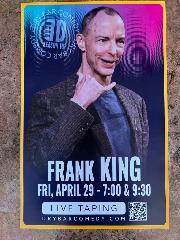2d (edited) • General discussion
The Best CRM for Speakers and Best Form of Business
I will be on video today (as I'll be at 35K feet when the session starts) going through some more of the tools in www.speakingbusiness.tools followed by advice on getting a CRM (which I believe you should have), and what's the best business form, DBA, LLC, C-Corp, etc., for a speaking business.
And here's a link to that video in case you miss the session, or for some reason I cannot get the session started without me: https://us02web.zoom.us/rec/share/zEr6k22PiB9HFY9oPTGHGCBwUEp3rrMt_V98ZPZuyp0nF0BlAGARTl3Wb7OoB6tm.QY7K0Fw45HaQxK1c
Passcode: w1Rx8N.2
Here’s a breakdown of popular CRM (Customer Relationship Management) software subscriptions, ranked roughly from lowest monthly cost to higher, along with why they’re good for salespeople and examples of each:
💲 Low-Cost CRMs (Budget-Friendly)
- HubSpot CRM (Free / $20–30 per user/month for paid tiers)
- Zoho CRM (from ~$14 per user/month)
💲💲 Mid-Tier CRMs (Balanced Pricing + Features)
- Freshsales by Freshworks (from ~$15 per user/month)
- Insightly (from ~$29 per user/month)
💲💲💲 Higher-Tier CRMs (Enterprise Level)
- Pipedrive (from ~$21 per user/month, scales up)
- Salesforce Sales Cloud (from ~$25–75+ per user/month depending on plan)
- Microsoft Dynamics 365 Sales (from ~$65 per user/month)
✅ Key Takeaway
- On a tight budget? Start with HubSpot Free or Zoho CRM.
The attached doc is a side by side comparison of the CRMs.
----------------------------------------------------------------------------------------------------------------------------------
The best business entity for a professional public speaker is typically a Limited Liability Company (LLC). An LLC offers a strong balance of liability protection, flexibility, credibility, and straightforward tax treatment that fits most speaking businesses better than a C-Corp, DBA, or other structures. Below are the main types, an explanation of why LLCs stand out for speakers, and examples for context.
LLC (Limited Liability Company)
- Why it's best: An LLC protects personal assets if the business is sued or incurs debts—important for speakers who travel, deal with venues, or may face libel or contract issues. It offers flexibility in management and tax filing options, and generally appears more professional to event planners and bureaus compared to a sole proprietorship.
- Tax perks: Profits “pass through” to the owner’s tax return, avoiding corporate double taxation. Option to be taxed as an S-corp or C-corp for further tax planning.
- Credibility: Contracts, invoices, and event agreements under an LLC enhance professional image and client trust.
- Example: Many top speakers (e.g., motivational industry leaders) operate as “Name Speaking LLC” or “Mission XYZ LLC” for legal and branding purposes.
DBA (“Doing Business As”)
- What it is: Simply registering a trade name; it’s not a legal entity.
- Drawback: No liability protection—your personal assets are at risk, and it only gives you the right to operate under a different business name.
- When to use: For a sole proprietorship wanting a brand name, e.g., “InspireMore,” but all contracts and risks remain with the individual.
C-Corp (C Corporation)
- What it is: A separate legal entity with extensive requirements; generally unnecessary unless you plan to seek investors or go public.
- Drawback: High administrative costs, complex setup, double taxation on profits, not worth it for a solo or small group speaking business.
- When to use: Rarely needed for speakers, unless you intend to build a large company, hire many staff, and raise significant outside funds.
S-Corp (S Corporation)
- What it is: A special tax status available to LLCs or corporations, not a business structure itself. Sometimes used by established speakers with high profits to reduce self-employment taxes.
- Note: Many LLCs elect S-Corp status after reaching certain income thresholds.
Bottom Line
- For nearly all professional speakers, an LLC gives the best protection, credibility, and flexibility for solo or small-team operations.
- Reserve a C-Corp for larger-scale multimedia businesses or when seeking significant outside investment.
- Only use a DBA for name flexibility if you’re maintaining a sole proprietorship, but recognize there’s no liability shield.
Most experts in the speaking industry recommend forming an LLC, optionally filing for a DBA if you want a brand name, and consulting a CPA or business attorney as your revenue grows or your needs become more complex.
3
4 comments
powered by

skool.com/speak-and-grow-wealthy-method-3991
How to Land and Leverage a TEDx Talk and Speak and Grow Wealthy
Suggested communities
Powered by
